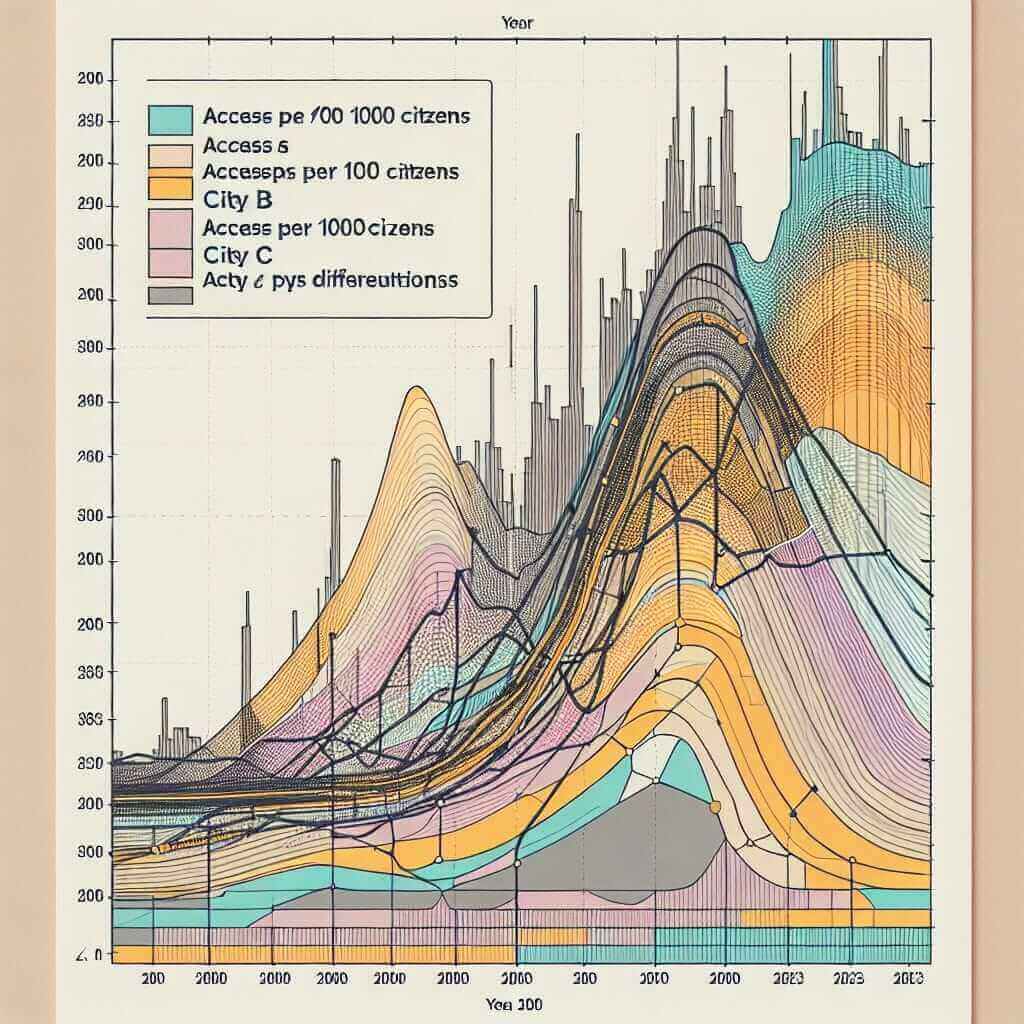In this article, we will delve into the topic “Comparing Levels of Access to Public Transportation in Different Cities (2000-2023).” This content is tailored for IELTS candidates aiming to improve their writing skills, specifically for the IELTS writing task 1. You’ll find a comprehensive approach towards writing a high-scoring task 1 essay, including detailed analysis, sample writing, crucial vocabulary, grammatical structures, and tips.
Introduction
Public transportation is a significant topic often appearing in IELTS writing task 1. Candidates might be asked to compare data about public transportation systems in different cities over a period. This hypothetical example will help you understand how to tackle such prompts.
Example Prompts
- The charts below show the levels of access to public transportation in City A, City B, and City C from 2000 to 2023.
- The graphs represent the public transportation accessibility trends in five major cities from 2000 to 2023.
- Compare the data presented in the following table regarding public transportation access in different urban areas between 2000 and 2023.
Main Content
Selected Task
Let’s select the first example prompt:
The charts below show the levels of access to public transportation in City A, City B, and City C from 2000 to 2023.
Actual Data Representation
Assumed Data for Explanation:
Table Representation:
| Year | City A (access/1000 citizens) | City B (access/1000 citizens) | City C (access/1000 citizens) |
|---|---|---|---|
| 2000 | 400 | 500 | 600 |
| 2005 | 450 | 550 | 620 |
| 2010 | 500 | 600 | 640 |
| 2015 | 550 | 620 | 660 |
| 2020 | 580 | 650 | 680 |
| 2023 | 600 | 670 | 700 |

Analyzing the Task
- Identify Key Features: Note the levels of access, the timeline (2000-2023), and the comparison between cities.
- Trends: Observation reveals a general increase in access over time in all cities.
- Comparisons: City C consistently has the highest access level, while City A started lowest but shows a significant growth rate.
Sample Writing
Model Paragraph:
The charts illustrate the levels of access to public transportation per thousand citizens in three cities—City A, City B, and City C—from 2000 to 2023. Overall, all three cities have experienced an increase in public transportation access over the period.
In 2000, City C had the highest access level with 600 accesses per thousand citizens, followed by City B with 500, while City A lagged behind at 400. By 2023, City C maintained its lead, rising to 700 accesses per thousand, although the gap between the cities narrowed slightly. City B showed consistent growth, reaching 670, and City A closed the gap further, achieving 600 accesses per thousand citizens.
These trends indicate a sustained effort to improve public transportation accessibility across the cities, with City A showing the most significant relative increase, suggesting a focused policy push in this urban area.
Word Count: 154
Key Points
- Descriptive words and phrases like “illustrate,” “experienced an increase,” “maintained its lead,” and “consistent growth” help in succinctly summarizing the data.
- Use of comparative phrases like “highest access level,” “lagged behind,” “narrowed slightly,” and “closed the gap.”
- Presenting the figures in a relative context strengthens the analytical aspect.
Important Vocabulary and Grammar
-
Vocabulary:
- Access (n) /ˈækses/: The ability to use or get something.
- Illustration (n) /ˌɪl.əˈstreɪ.ʃən/: An example or instance that helps explain something.
- Consistent (adj): /kənˈsɪstənt/: Steady, regular.
- Relative (adj): /ˈrɛlətɪv/: Considered in relation to something else.
- Sustain (v): /səˈsteɪn/: To keep something going.
-
Grammar:
- Comparative and Superlative Adjectives: E.g., “higher,” “highest,” “more significant.”
- Passive Voice: E.g., “access to public transportation has been improved,” “the gap was narrowed.”
Writing Tips
- Identify Trends: Spot and write about upward, downward, and stable trends.
- Comparison: Always compare, rather than describe in isolation.
- Accuracy: Ensure figures and years match the data.
- Structure: Maintain a clear introduction, analysis, and overall trend summary.
- Conciseness: Keep within the word limit and be concise in descriptions.
Conclusion
For tasks involving data comparison over time, ensure you understand and highlight key trends, maintain comparative analysis, and use accurate vocabulary and clear grammatical structures. Practice with various datasets and task types to boost your proficiency and achieve higher band scores.
Remember, precision, clarity, and structured approach are keys to excelling in IELTS writing task 1, especially with complex data comparisons.